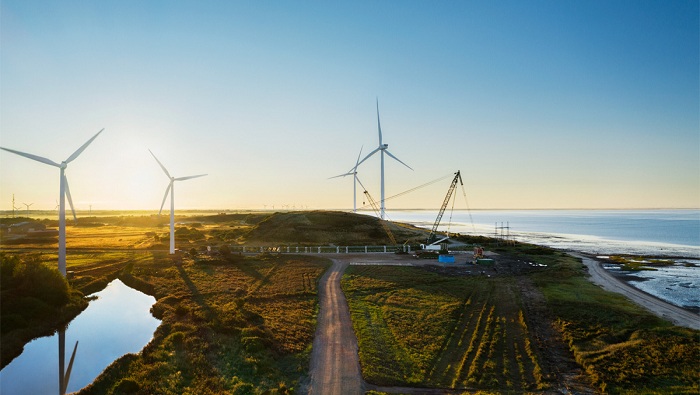World’s largest onshore wind turbines in Denmark and new clean energy efforts in Germany advance Apple’s new 2030 carbon neutral goal.
Today Apple announced it will invest in the construction of two of the world’s largest onshore wind turbines, a source of clean, renewable energy that will bring its supply chain and products one step closer to carbon neutrality. Located near the Danish town of Esbjerg, the 200-meter-tall turbines are expected to produce 62 gigawatt hours each year — enough to power almost 20,000 homes — and will act as a test site for powerful offshore wind turbines. The power produced at Esbjerg will support Apple’s data center in Viborg, with all surplus energy going into the Danish grid. “Combatting climate change demands urgent action and global partnership — and the Viborg data center is powerful proof that we can rise to this generational challenge,” said Lisa Jackson, Apple’s vice president of Environment, Policy and Social Initiatives. “Investments in clean energy deliver breakthrough innovations that bring clean energy and good jobs to businesses and local communities. This is an area where we have to lead — for the sake of our planet and future generations.”
A construction site near onshore wind turbines.
Apple is investing in the construction of two of the world’s largest onshore wind turbines near the Danish town of Esbjerg.
Last month, Apple announced its plans to become carbon neutral across its entire business, manufacturing supply chain, and product life cycle by 2030. While Apple’s operations are already powered by 100 percent renewable energy and carbon neutral, this new commitment will mean that by 2030, every Apple device sold will have net zero climate impact. This includes transitioning all of its European-based suppliers to renewable power.
A worker examines a solar array.
Supplier Clean Energy Progress
Germany-based supplier Varta committed this week to running its Apple production with 100 percent renewable power. Across Europe, Apple’s suppliers are working toward clean energy solutions for their Apple productions — including Henkel and tesa SE, also based in Germany, DSM Engineering Materials based in the Netherlands, STMicroelectronics based in Switzerland, and Solvay based in Belgium. These solutions include DSM’s wind power purchase agreement in the Netherlands and STMicroelectronics’s solar carport in Morocco. Companies like Solvay are now expanding their use of renewable energy to their broader operations after joining Apple’s Supplier Clean Energy Program five years ago. Apple launched the program in October 2015 to help suppliers reduce their energy use and transition to 100 percent renewable electricity. Since its launch, 72 manufacturing partners in 17 different countries have committed to 100 percent renewable energy for Apple production. Once all of Apple’s supplier projects are completed, these commitments will avoid over 14.3 million metric tons of CO2e annually — the equivalent of taking more than 3 million cars off the road each year.
Viborg Data Center
Apple’s data center in Viborg, a 45,000-square-meter facility offering network support and data storage to its users across the region, is now operational. The data center helps power Apple’s App Store, Apple Music, iMessage, Siri, and other services in Europe that are run entirely on renewable energy from local projects.
The Esbjerg wind energy project follows the recent completion of one of Scandinavia’s largest solar arrays, located in Thisted, Northern Jutland, the first Danish solar project built without the use of public subsidies. The wind and solar projects both support Apple’s newly completed data center in Viborg, which is powered by 100 percent renewable energy. Apple is developing both projects in partnership with European Energy. The Viborg data center had over 600 specialist workers on site each day during construction and included many Danish businesses supporting its development. It is now run by a team of data specialists, technicians, maintenance, and security staff, many of whom were recruited from the local area.





































